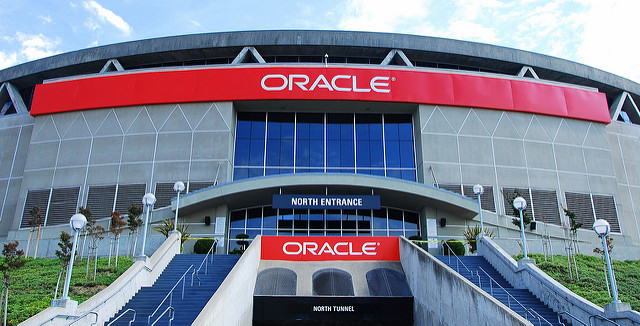Oracle Might Increase Its Offer For NetSuite

For the past couple of years, cloud has dominated Oracle’s strategy. In July, it announced its plans to acquire NetSuite (N) for $9.3 billion, which underlines this focus. This would be one of its larger multi-billion deals with only the $10.4 billion acquisition of PeopleSoft in 2004 beating it. However, the deal has hit some hurdles as a result of opposition from T. Rowe Price, the second largest stock holder after Larry Ellison who is also a major shareholder in Oracle (NYSE: ORCL).
Oracle’s Recent Financials
Oracle’s first quarter revenues were up 2% over the year to $8.6 billion, marginally shy of the analyst estimates of $8.7 billion. EPS was up 4% to $0.55 for the quarter, missing the Street forecast of $0.58.
It ended the quarter with cash balance of $28.6 billion and marketable securities of $39.7 billion. The Board of Directors also declared a quarterly cash dividend of $0.15 per share of outstanding common stock.
By segment, Oracle’s cloud business is doing well while other segments are seeing a decline. Software sold as cloud service and Platform-as-a-Service grew 77% over the year to $798 million. Cloud Infrastructure-as-a-Service revenues grew 7% to $171 million, translating to total cloud revenue growth of 59% to $969 million. New software licenses revenue fell 11% to $1.030 billion and Software license updates and product support revenues increased 2% to $4.792 billion. Total hardware revenue declined 12% to $996 million. Total services revenues fell 6% to $808 million.
For the second quarter of fiscal 2017, Oracle expects SaaS and PaaS revenue to grow again by 78% to 82%. Software and cloud revenue, including SaaS/PaaS and IaaS, new software license and software support is expected to grow 3% to 5%. Total revenue growth in the second quarter is expected to range from 0% to 3%. EPS is expected to be between $0.59 and $0.62 in constant currency. Analysts expect earnings of $0.65 on revenue of $9.26 billion.
Based on its performance, Oracle raised its full-year guidance. It now expects SaaS and PaaS revenue growth from 65% to 67% for fiscal year 2017. Analysts expect earnings of $2.76 on revenue of $37.94 billion.
Oracle’s Acquisitions
Early this month, Oracle announced its plans to acquire LogFire, a provider of cloud-based warehouse management applications. LogFire’s built-for-the-cloud solution provides an integrated warehouse, inventory, and workforce management platform that easily scales with increased volume and complexity. LogFire is expected to complement the logistics functionality of the Oracle SCM Cloud by adding cloud-based warehouse management capabilities. Terms of the deal were not disclosed.
At the end of July, Oracle announced the NetSuite deal. During the earnings call last week, it clarified that it has now cleared antitrust reviews everywhere, except the United States, where its waiting period expires at the end of September.
Founded in 1998, NetSuite was one of the first few SaaS or cloud companies. While Larry Ellison was dismissive of the SaaS phenomenon at that time, he was a majority shareholder in NetSuite. NetSuite was a success and so was SaaS. Its revenue in 2015 was $741.1 million and net loss was $124.7 million. NetSuite’s success and its connection with Larry made it a prime target.
The NetSuite deal is expected to help Oracle compete against SAP and Workday. But its most attractive proposition for Oracle would be its SME focus, which would perfectly complement Oracle’s weakness in the sector. I have long maintained that NetSuite would be a game changing acquisition for Oracle.
The cloud market has seen some consolidation of late and this VentureBeat article says the timing is perfect – if Oracle hadn’t made the move, Salesforce, Microsoft, or SAP would have swooped in on NetSuite. And that is why and with the added pressure from T. Rowe Price, Oracle might end up increasing its offer for NetSuite. NetSuite is currently trading at $109.56 at a market cap of about $8.9 billion.
Oracle is currently trading at $38.92 with a market cap of $160.46 billion. Its 52-week range is $33.13 – $42.00.
Photo Credit: May Wong/Flickr.com
More investigation and analysis of Unicorn companies can be found in my latest Entrepreneur Journeys book, more



